Campaigners launched a wave of protests at railway stations on Tuesday, as it was confirmed that fares in England would go up by an average of 4.1% in January – and that some could rise by more than 9%.
The rise will add around £200 to the cost of many commuters' season tickets. Consumer groups and unions warned that 11 years of above-inflation fare increases were pricing people out of train travel.
Under government policy to make passengers shoulder substantially more of the cost of the railway than taxpayers, regulated fares – off-peak intercity tickets and season tickets – are to rise by 1% above inflation. The measure is fixed by July's RPI figure, which was 3.1%, according to official data published on Tuesday.
Train operators are allowed to raise some fares by an additional 5%, as long as the average remains under the cap. That means some fares could rise by as much as 9.1%.
Last year commuters in Kent were among the hardest hit as fares rose beyond the RPI+1% cap, lifting some season tickets to £5,820 for travel on high-speed services into London. Tuesday's inflation figures mean they face a likely rise of £238 and potentially up to £519.
The Trades Union Congress (TUC) and the Action for Rail campaign group were staging demonstrations at almost 50 stations, warning that by January the cost of train travel will have leapt by 40% in six years, far outstripping the rise in wages.
The transport secretary, Patrick McLoughlin, told the BBC the government was investing heavily in the railways.
He said: "Nobody likes to see rail fares go up. Running the railways is a very expensive business. The taxpayer, overall, is contributing a lot and I am afraid that the passenger has to make his contribution."
However, Labour said ministerial incompetence in the wake of the West Coast rail franchising fiasco had wasted more money than was being raised through increased ticket prices. Government figures indicated an inflation-only rise would have cost the government £67.5m in lost revenues. But Labour noted new contract extensions with Virgin and National Express were at the same time returning £78.5m less to the Treasury annually than under previous franchises.
Maria Eagle, the shadow transport secretary, said: "David Cameron claims to want to end the era of above-inflation fare rises, yet we now know that he could have done so if it wasn't for the appalling deal secured by his transport ministers when they negotiated rail franchise extensions."
The TUC general secretary, Frances O'Grady, said: "Every year hard-pressed rail commuters have to hand over an ever greater share of their earnings just to get to and from work. Wage-busting fare rises are not even going on much-needed service improvements either. Instead, passenger and public subsidies are lining the pockets of the shareholders of private rail companies."
Michael Roberts, chief executive of the Association of Train Operating Companies, said: "Government determines how the average season ticket price rise is set each year. Since 2004 it has been government policy to allow regulated fares to rise above inflation in order to support investment in more trains, better stations and faster services."
Rail fares in Scotland will be pegged to inflation only. Fare rises in Wales have yet to be confirmed.
New fares will be published by train companies later this year. Rises will come into effect on 2 January 2014.
Stephen Joseph, of the Campaign for Better Transport, said commuting was now the biggest expense, ahead of food and housing, for many workers. He said: "One of the surest ways of stamping on any green shoots of recovery is to price people off the trains and out of the jobs market. For the sake of the economy we should end above-inflation fare increases now, and start planning for fare reductions."
The TSSA union protested outside the Department for Transport (DfT) in London, against rail minister Norman Baker, saying the Liberal Democrats had "betrayed rail users just like they did students" [over tuition fees]. It said fares had shot up under the coalition despite the party's manifesto pledge to reduce the rises.
Rail fares increased over the past decade even faster than house prices, according to the RMT union, which calculated tickets across the network – both regulated fares and those left to train operators' discretion – had increased 57.7% in the decade to January this year. That compared with a 36.7% rise in the cost of the average UK house in the same period.
Bob Crow, general secretary of the RMT, said: "While rail fares are rising by nearly 10% on some routes, the private train companies are in there stitching up secret franchise extensions with the government that are a one-way ticket to the bank for shareholders."
A DfT spokesman said: "The government is investing record amounts in our railways, which will help deliver economic growth, improve performance and significantly boost passenger capacity. However, we also recognise it is tough for passengers. That is why we are already limiting these rises by capping the average regulated fares increase at 1% in real terms, and will be announcing further measures to ensure greater fairness on fares for passengers later this year."
The government has been considering a reform of train fares, including more flexible season tickets for part-time workers or for those willing to travel only on off-peak services. However, the promised rail fares and ticketing review has been delayed until the autumn.
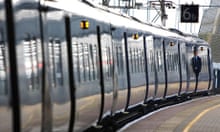
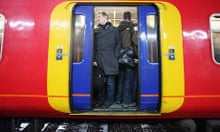
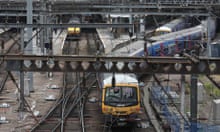


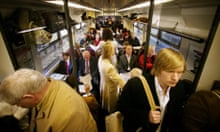
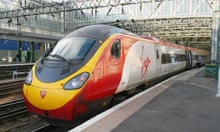
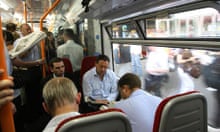
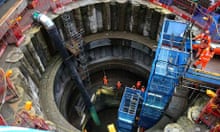
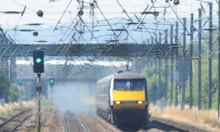
Comments (…)
Sign in or create your Guardian account to join the discussion